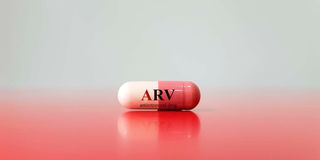Concern as HIV patients exposed to fake medicines

Two counterfeit HIV drugs may be illegally circulating in the country
What you need to know:
- Two counterfeit batches of Truvada may be circulating illegally in the country, pointing to looming risks.
- Pharmacy and Poisons Board has alerted those who might have accessed the drug to stop using it.
Patients who may have been exposed to fake and poor-quality HIV medicines have raised concerns about their treatment.
The Pharmacy and Poisons Board (PPB), in a public notice, indicated that two counterfeit batches of HIV drug, Truvada, may be circulating illegally in the country, pointing to looming risks.
The regulatory body announced the possibility that the drug had safety, quality and efficacy irregularities and is likely to result in speculation that it is reaching medicine cabinets in Kenyan households.
A statement by PBB Chief Executive Officer Fred Siyoi says the product was falsely packaged and labelled.
“The Pharmacy and Poisons Board wishes to alert the public to suspicious batches of falsified and substandard Truvada products suspected to be circulating in the Kenyan market. The product batches in question are Truvada 200mg/300mg tablets (Emtricitabine 200mg/Tenofovir Disproxil 300mg) manufactured by Gilead Sciences Inc. bearing batch numbers B4033894D and B425875D,” reads the statement.
Also Read: Sh10bn funding gap hindering HIV fight
“The public is notified that these product batches are illegally in the market as they have failed to meet the approved marketing authorisation requirements evidenced by falsified packaging and labelling. Consequently, the PPB cautions against the use of these batches as their safety, quality and efficacy cannot be assured.”
Dr Karim Wanga, the chief principal regulation officer in charge of product safety at the PPB, says the drug is an antiretroviral used by people living with HIV, but the two falsified batches lack one key ingredient and are being sold with false labels.
“The two falsified batches are what we have been able to detect in the Kenyan market. Working with the brand owner of these products, who has been authorised to market the products, we found that the two batches are falsified. The labels are not the original. Based on that, our mandate is to protect public health and safety. That is why we shared the information with the public,” he explained.
“The drug lacks one of the ingredients. The danger is that a patient who needs them will not get the expected treatment outcome. That is why they need to stop its uptake if they have already bought the two batches.
“Because the product is falsified, we cannot guarantee its efficacy, safety and quality. We are asking anyone who is in possession, whether they are dispensers, pharmacists or patients themselves, to immediately get in touch with the PPB or with their healthcare provider.”
According to the board, whereas, there are still no reported adverse events related to the use of the drugs, it nonetheless sounds an alarm over fake medication in the market.
“We are calling on people who have these batches to stop using them. This is because the product is already licensed to be sold in the Kenyan market. It has a market authorisation holder who has been marketing it in Kenya. But these two batches are the ones that have been detected to have a problem,” said Dr Wanga.
Mr Peter Gwengi, the executive director of Lake Victoria Initiatives, warned that the threats of counterfeiting HIV drugs will lead to life-threatening situations. “I know of so many of my people who are taking drugs in chemists and pharmacists in the country, and this is because of stigma; they do not want to be seen to be taking the drugs, it is no longer safe for them and I am afraid the next time they will be using the same drug, it will not be working,” Mr Gwengi said.
He said that having substandard HIV drugs in the market is proof that our supply chain allows foreign and unregistered drugs. “There are things that we should not take chances on, we are putting millions of lives at risk, they have just recalled the ones they know, which makes them think that no such drug is on the market. I am worried for my people,” says Mr Gwengi, who has been on antiretroviral drugs for decades.
Also Read: Agency pushes for more state funding for HIV
He urged patients to pick their drugs from renowned public hospitals for their safety. “HIV is not a death sentence, but taking fake drugs may lead to early deaths. It is better to be known to have HIV and leave longer than hiding your status and dying from taking the wrong drugs, yet you can avoid that,” he said.
“Fake HIV medications should serve as a reminder to patients and policymakers alike that more needs to be done to protect our access to medications.
“Even if we withdraw from using and we have used it, are we causing more harm than good, antiretrovirals are lifelong drugs and if we are not careful, we are silently killing more Kenyans,” Mr Gwengi added.
According to a source within the Health ministry who spoke to the Saturday Nation on condition of anonymity, the drugs were not registered in Kenya and they were imported by persons known to the authority.
“This is not about drugs getting into the country through porous borders, they are connected people, we have been singing about the porous borders for years. Should we watch people die for the regulatory body to blame the borders? Let us act,” said the ministry official.
He said this is just one batch, but a lot is happening behind the scenes, emphasising the need for Kenyans to be more vigilant as “we are on their own. ”






